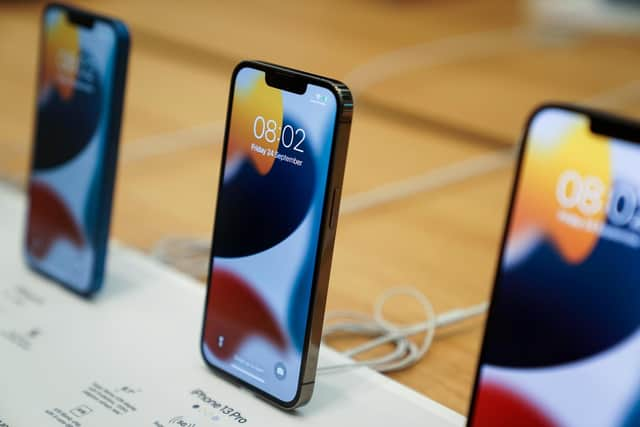Apple iPhone battery: Millions of iPhone users could get payouts in legal action - here are the iPhone models included in the claim
and live on Freeview channel 276
A consumer champion has launched a more than £750 million legal claim against Apple, linked to an incident in 2017 around a power management tool on older iPhone models.
Justin Gutmann alleges the company misled users over an upgrade that it said would enhance performance but, in fact, slowed phones down and is seeking damages of around £768m for up to 25 million UK iPhone users.
Advertisement
Hide AdAdvertisement
Hide AdGutmann has accused the tech giant of slowing down the performance of iPhone handsets – a process known as “throttling” – by hiding a power management tool in software updates to combat performance issues and stop older devices from shutting down suddenly and has filed a claim with the Competition Appeal Tribunal.


It alleges that Apple misled users over the incident by pushing them to download software updates it said would improve the performance of some devices but, in fact, slowed them down.
Apple has said in a statement it has "never" intentionally shortened the life of its products.
The claim relates to the introduction of a power management tool released in a software update to iPhone users in January 2017, which was rolled out to slow down older iPhone models with ageing batteries, which may have struggled to run the latest iOS software, in order to prevent abrupt device shutdowns.
Advertisement
Hide AdAdvertisement
Hide AdMr Gutmann said information about this tool was not included in the software update download description at the time or that it would slow a user’s device.
He claims that Apple introduced this tool to disguise the fact that iPhone batteries were unable to cope with new iOS processing demands and that rather than recall products or replace batteries, the company instead pushed users to download the software updates.
The legal claim says Apple did add a mention of the tool to the release notes for the update on its website at a later date but says the company failed to make clear that it would slow down older iPhones.
In 2020, Apple agreed to pay $113m to settle allegations that it slowed down older iPhones.
Advertisement
Hide AdAdvertisement
Hide AdIn late 2017, Apple apologised for its handling of the issue and said it would replace batteries for a heavily reduced rate for a limited time and also introduce a feature to allow users to turn off the power management tool.
At the time, the company said it has never, and would never do anything, to intentionally shorten the life of a product, and Apple chief executive Tim Cook publicly apologised over the incident.
The claim relates to the iPhone 6, 6 Plus, 6S, 6S Plus, SE, 7, 7 Plus, 8, 8 Plus and iPhone X models.
It seeks compensation for each model owned and is an opt-out claim, meaning customers will not need to actively join the case to seek damages.
Advertisement
Hide AdAdvertisement
Hide AdIn a statement, Apple said: “We have never, and would never, do anything to intentionally shorten the life of any Apple product, or degrade the user experience to drive customer upgrades.
“Our goal has always been to create products that our customers love, and making iPhones last as long as possible is an important part of that.”
